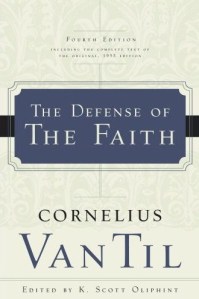Book Review: The Defense of the Faith


The Defense of the Faith (Fourth Edition), Cornelius Van Til, edited by K. Scott Oliphint, Phillipsburg: P&R, 1955 (2008). Paperback, 428 pages, $19.99 USD.
“I regard Christianity as the most fatal and seductive lie that has ever yet existed — as the greatest and most impious lie.” Thus spoke the German philosopher Friedrich Nietzsche towards the end of the 19th century. Athough few in our postmodern age will be as blunt about it as Nietzsche, attitudes such as his still exist. Unbelief continues to challenge Truth just as it did 100 or even 2000 years ago. Regrettably there has not been much of a Reformed attempt at turning the tables on unbelief, at least not in my own immediate (Canadian Reformed) background. However, today’s situation is different and today one increasingly reads about apologetics (the study of the defense of the Christian faith).
In North America, already in the 1800s, Reformed scholars such as B.B. Warfield were making efforts at defending the faith from the encroaching unbelief. These efforts would culminate in the seminal work of Cornelius Van Til. Van Til was born in the Netherlands in 1895 and immigrated to the US at a young age. He eventually became a Christian Reformed pastor and later joined the Orthodox Presbyterian Church when he became professor of apologetics at Westminster Theological Seminary in Philadelphia. It was in that capacity that he wrote most of his works. The most important of these has undoubtedly been his 1955 book, The Defense of the Faith. This is now the fourth edition and it completely restores the unabridged 1955 text. It differs from the third edition in that it deals much more extensively with Van Til’s critics, especially those in the Christian Reformed Church, and this makes for a bulkier volume.
The Defense of the Faith presents in detail the principles underlying Van Til’s approach to defending the Christian faith. The most important of these principles is that our method of defending the faith should be in line with our theology. It will not do for Reformed people to be arguing for the truth of Christianity with Roman Catholic or Arminian methods. Reformed theologians need a Reformed approach in everything they set their hands to — that is the abiding and most important contribution of Van Til.
Van Til’s approach is often called “presuppositional apologetics” It is “presuppositional” because it is based on the “presupposition” or assumption that Scripture is true. It begins with the truth of what God reveals in His Word and then proceeds to present that truth in a Scriptural way to the unbeliever without any compromise. The unbeliever must be shown that life apart from God is foolishness — all the time realizing that it is the Holy Spirit, not our good arguments, which may convince the unbeliever and turn him to Christ. Would it be too much to say that Van Til’s approach is the Reformed approach to apologetics, at least in its basic principles? Read the book and judge for yourself. It should be pointed out, however, that The Defense of the Faith is at times heavy reading. Van Til sometimes used philosophical or theological terms which may not be familiar to the average reader. This new edition includes annotations written by Scott Oliphint. These should shed light on most of the unfamiliar terms, as well as persons whose significance has become more obscure since Van Til’s day. Another improvement comes in the way of a thorough index – something missing from the third edition.
Cornelius Van Til passed away in 1987, but his importance remains, for he emphasized so strongly the need for a Reformed defense of the faith. In this emphasis, he always insisted that he was saying nothing new; he was only repeating what he had been taught about the priority of Scripture by the writings of such giants as Abraham Kuyper and Herman Bavinck. We must always start with Scripture in everything — whether it is in theology or apologetics or anything else for that matter. We need this emphasis also today as we live in the midst of a crooked and perverse generation. It is only this basic teaching which will give us what VanTil calls “nuclear firepower” for the war in which we find ourselves.



Great review! I did not read the newer edition with Scott Oliphint’s footnotes, though when I saw it I wished I read this edition just for the insight Scott Oliphint would have!
God bless!
Nice review. My edition arrived yesterday.